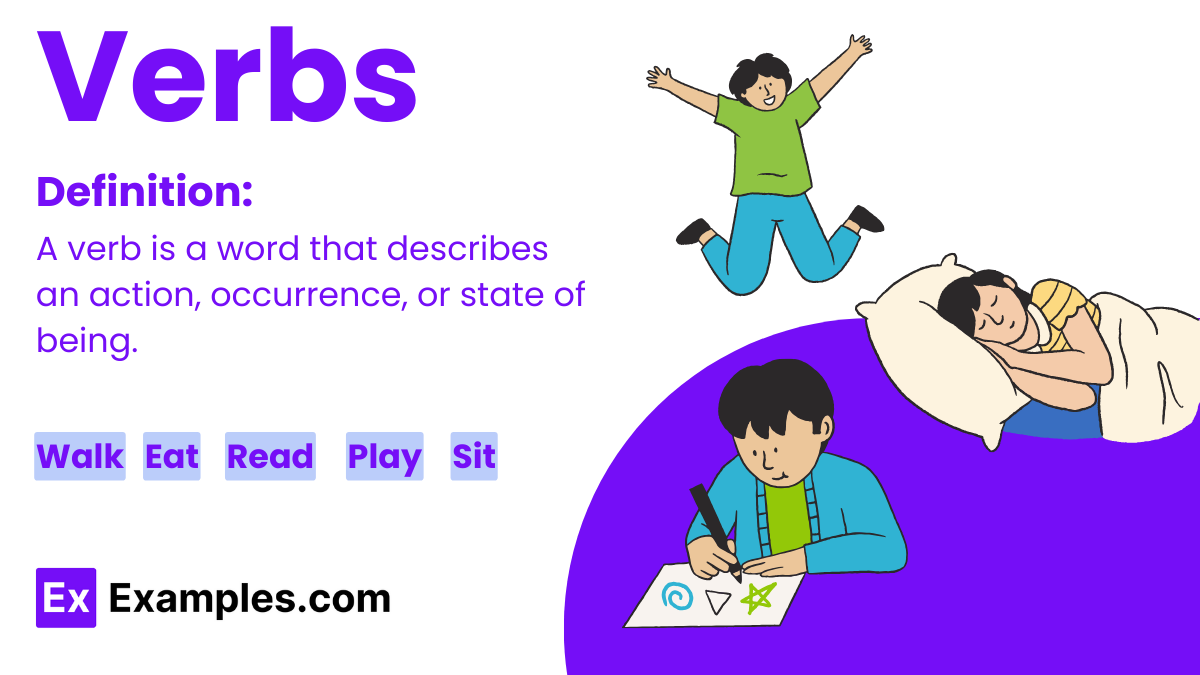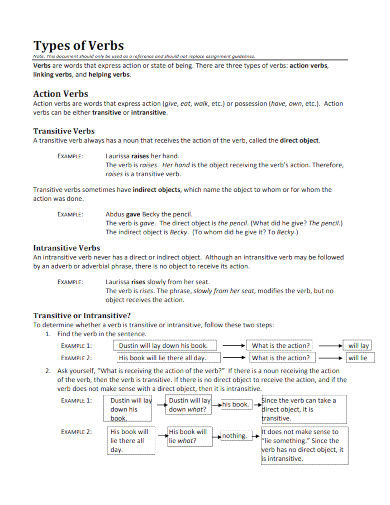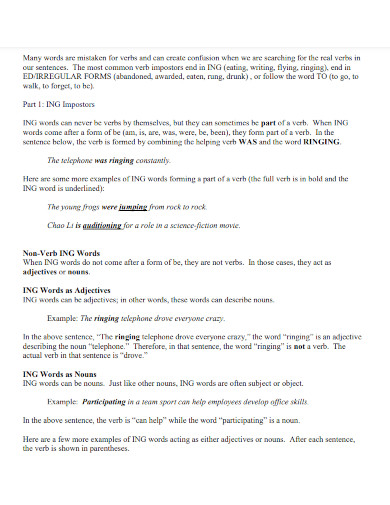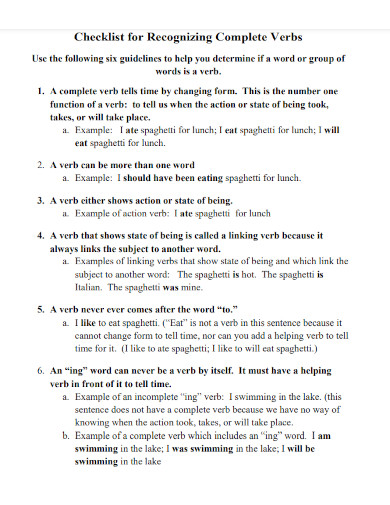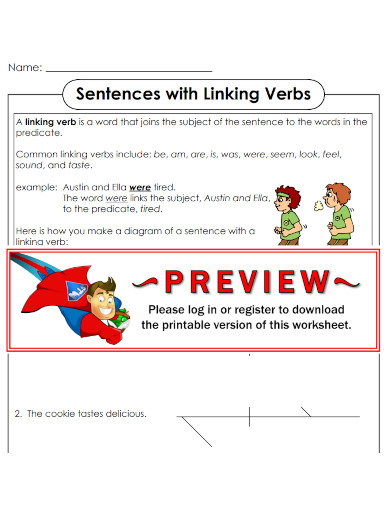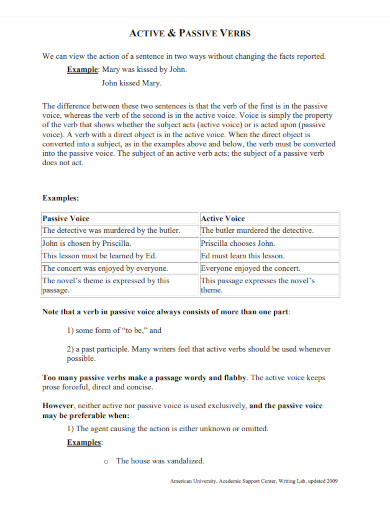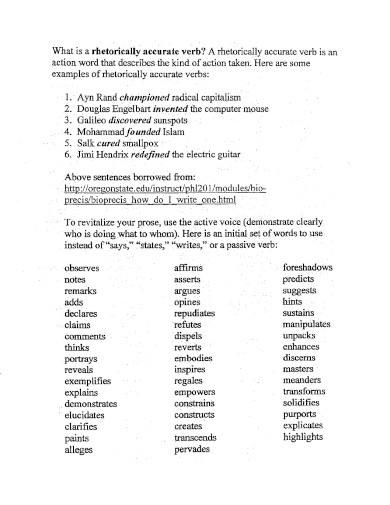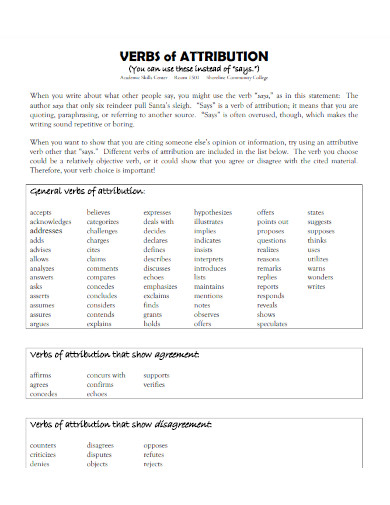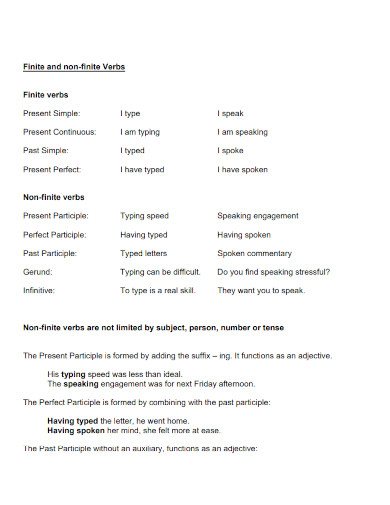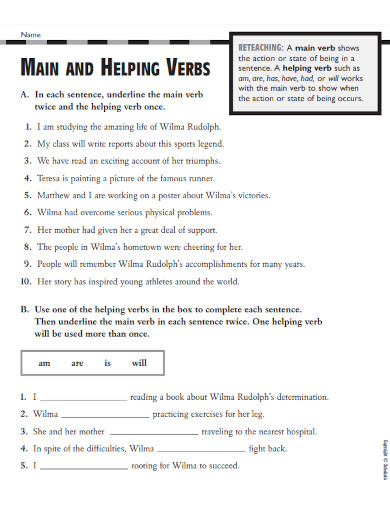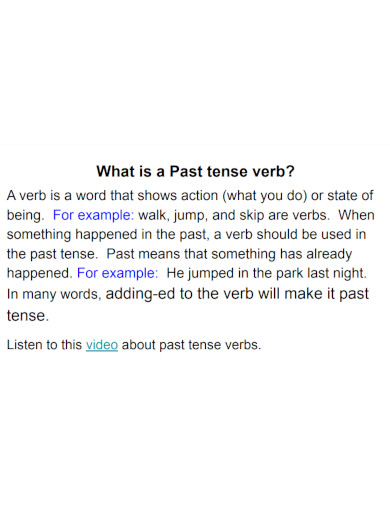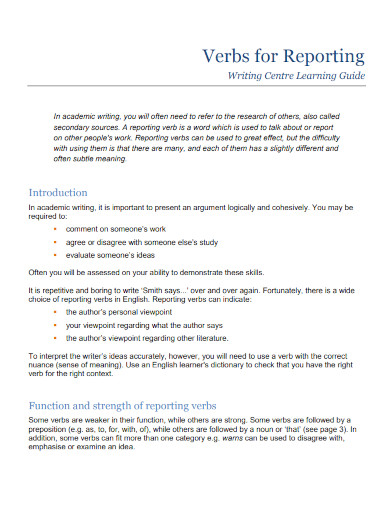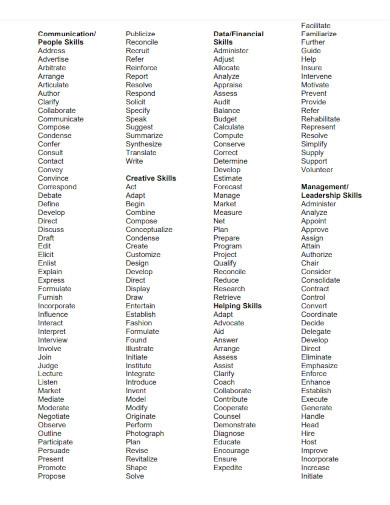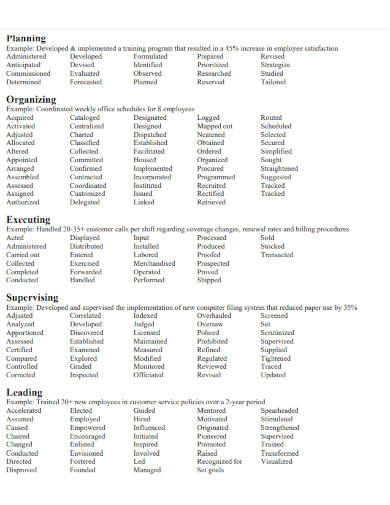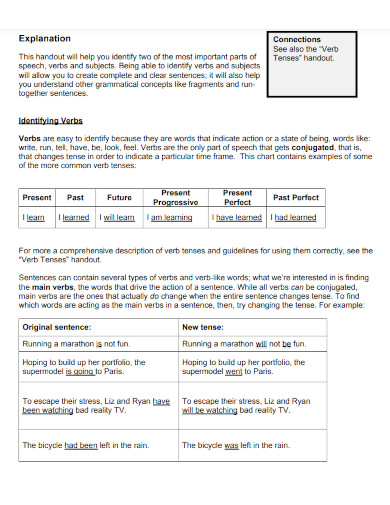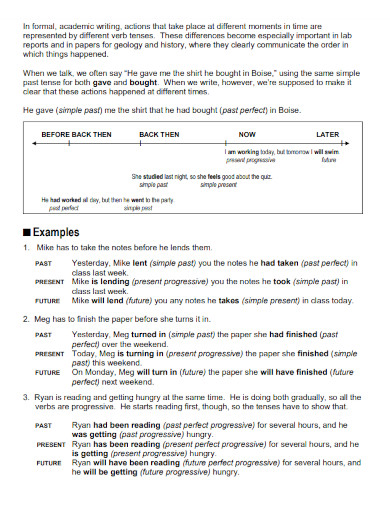15+ Verbs Examples
Schoolchildren are usually taught that verbs are “doing” transition words, which means that they are part of the sentence (whether simple, compound-complex, or balanced sentences) that explains what is happening: He ran away, she eats chocolate cake on Sundays, and the horses gallop across the fields. The words ran, eats, and gallop show “action” in these sentences, so they are verbs. But it can be hard to tell because not all verbs are clearly action words, especially when they are metaphors: I know your name, Jack thought about it, and we looked at a few applications for you. These are verbs that don’t describe actions. They describe a state of being, an emotion, a thing, a sense, an annotation, or an opinion.
What is Verb?
A verb is a word that describes an action, occurrence, or state of being. Verbs are fundamental components of English syntax, as they typically indicate what the subject of a sentence is doing or experiencing.
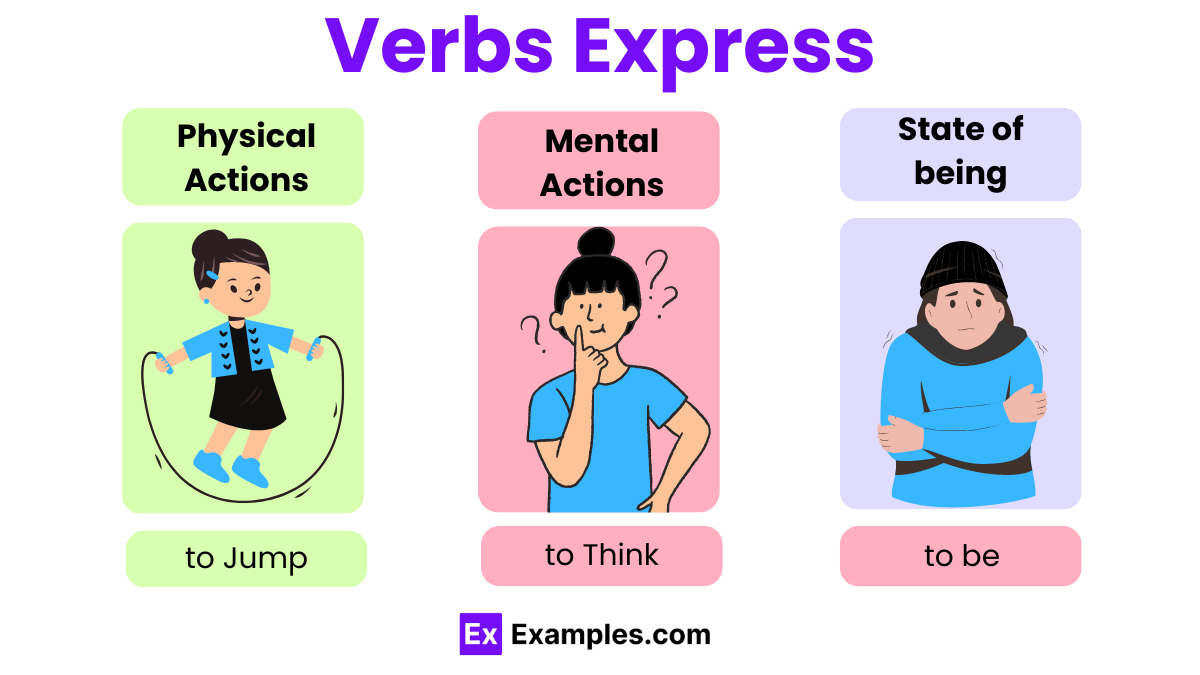
Types of Verbs
Different types of verbs is crucial for mastering English grammar. Here are the primary types of verbs:
| Type of Verb | Definition | Examples |
|---|---|---|
| Action Verbs | Express physical or mental actions. | run, jump, think, imagine |
| Linking Verbs | Connect the subject to a subject complement that describes it. | be, seem, become, appear |
| Helping Verbs | Help the main verb in a sentence by extending its meaning. | has, do, can, should, would |
| Transitive Verbs | Require a direct object to receive the action. | send, give, owe, show |
| Intransitive Verbs | Do not require a direct object. | sleep, travel, die, exist |
| Modal Verbs | Express necessity, possibility, permission, or obligation. | can, might, must, should |
| Phrasal Verbs | Consist of a verb and a preposition or adverb that modifies it. | break up, check out, run into |
| Irregular Verbs | Verbs that do not follow the regular conjugation rules. | go, eat, come, freeze |
| Regular Verbs | Verbs that follow a predictable pattern in the past tense. | play, want, listen, watch |
| Stative Verbs | Describe a state rather than an action. | know, love, need, own |
1. Main Verbs (Action Verbs)
Main verbs, or action verbs, express specific actions, processes, or states. They can be further classified into two sub-types:
- Transitive Verbs: These verbs require a direct object to receive the action. Example: She plays the piano.
- Intransitive Verbs: These verbs do not require a direct object. Example: He sleeps.
2. Auxiliary Verbs (Helping Verbs)
Auxiliary verbs are used together with a main verb to form a verb phrase, altering the tense, mood, or voice of the main verb. Examples include be, do, and have.
- Modal Verbs: A subtype of auxiliary verbs, modals are used to express necessity, possibility, permission, or obligation. Examples: can, will, must.
3. Linking Verbs
Linking verbs connect the subject of a sentence with a noun or adjective in the predicate that describes or identifies the subject. Common linking verbs include be, seem, become, and sensory verbs like feel, look, and smell.
4. Stative Verbs
Stative verbs describe a state or condition rather than an action. They often relate to thoughts, emotions, relationships, senses, states of being, and measurements. Examples: believe, love, own.
5. Phrasal Verbs
Phrasal verbs consist of a verb plus a preposition or adverb that changes the meaning of the main verb. Example: give up, look forward to.
6. Irregular Verbs
Irregular verbs do not follow the standard rules of conjugation in the past tense and past participle forms. Examples: go (went, gone), buy (bought, bought).
7. Dynamic Verbs
Dynamic verbs indicate active processes and can be used in the progressive tense. Examples include run, swim, and write.
Verb Forms
verb forms is crucial for mastering English grammar, as they are used to express different tenses, aspects, moods, and voices. Here’s an overview of the key verb forms and their uses:
| Verb Form | Description | Examples |
|---|---|---|
| Base Form | The simplest form of a verb, used as the infinitive without “to”. | walk, read, write |
| Past Tense | Used to describe actions completed in the past. | walked, read, wrote |
| Past Participle | Used in perfect tenses and passive voice; varies by verb. | walked, read, written |
| Present Tense | Indicates current action or habitual actions. | walk/walks, read/reads |
| Present Participle | Used for forming continuous tenses and as gerunds or adjectives. | walking, reading, writing |
| Third Person Singular | Alters the base form in present tense for “he, she, it”. | walks, reads, flies |
| Gerund | Identical to present participle, but used as a noun. | Swimming is fun. |
| Infinitive | The “to” form of a verb, used after many verbs, adjectives, and modals. | to eat, to be, to fly |
1. Base Form
- The base form of a verb is its simplest form, without any tense or subject agreement alterations. It is used as the infinitive with “to” (except after modal verbs, or verbs like “make” or “let”).
- Examples: to walk, to read, to write
2. Past Tense
- This form is used to describe actions that have been completed in the past.
- Regular verbs add -ed to the base form (e.g., walk → walked).
- Irregular verbs vary and must be memorized (e.g., go → went).
3. Past Participle
- Often used in perfect tenses and passive voice, this form also varies between regular and irregular verbs.
- Regular verbs use the same form as the past tense (e.g., walked).
- Irregular verbs have unique forms (e.g., gone).
4. Present Tense
- Indicates an action is currently taking place or regularly happens. There are two forms:
- Base form for most subjects (e.g., I walk, they read).
- -s form for third-person singular (e.g., he walks, she reads).
5. Present Participle
- Used for forming continuous tenses and as adjectives or gerunds, this form is created by adding -ing to the base form.
- Examples: walking, reading, writing
6. Third Person Singular
- Specifically alters the base form in the present tense for he, she, or it by adding -s or -es.
- Examples: walks, reads, flies
7. Gerund
- This form is identical to the present participle but functions as a noun.
- Examples: Swimming is fun. (Swimming used as a subject)
8. Infinitive
- The “to” form of a verb. It is used with modal verbs or after certain verbs and adjectives.
- Examples: to eat, to be, to fly
How to Use Verbs in Writing
Choose the Right Tense:
- Ensure the verb tense consistently matches the time frame of the actions or states being described.
- Use present tense for general truths and current actions, past tense for completed actions, and future tense for actions that will occur later.
Utilize Active Voice:
- Prefer active voice to passive voice to make sentences clearer and more direct (e.g., “The team achieved the goals” instead of “The goals were achieved by the team”).
Be Specific with Action Verbs:
- Choose specific and vivid action verbs to convey precise actions (e.g., “whisper” instead of “say quietly”).
- Avoid overusing vague verbs like “go,” “do,” or “make” which can weaken the impact of your writing.
Incorporate Modal Verbs for Nuance:
- Use modal verbs (can, could, may, might, must, shall, should, will, would) to express possibility, necessity, obligation, or permission.
- Modal verbs add depth to your writing by showing the mood or tone regarding the action.
Use Stative Verbs for Conditions or States:
- Employ stative verbs when describing conditions that are static, such as “believe,” “love,” “own,” or “prefer.”
- These verbs are not used in continuous tenses in standard English.
Employ Phrasal Verbs Appropriately:
- Phrasal verbs (verb + preposition/adverb), such as “put off” or “take out,” can add colloquial flavor to your writing but might be less formal.
- Be aware of the tone and clarity, as phrasal verbs can sometimes be vague or confusing for non-native speakers.
Link Ideas with Linking Verbs:
- Use linking verbs to connect the subject to a subject complement that describes or identifies it (e.g., “The sky is blue”).
- They are crucial for forming compound and complex sentences that add variety to your writing.
Keep Verb Agreement:
- Ensure verbs agree in number and person with their subjects. Singular subjects take singular verbs, and plural subjects take plural verbs.
- This is fundamental for maintaining grammatical accuracy in your writing.
Verb categories
1. Main Verbs
Main verbs (or action verbs) are the most important verbs in a sentence because they express the principal action or state of being.
- Examples: run, jump, eat, think, be
2. Auxiliary Verbs (Helping Verbs)
Auxiliary verbs accompany main verbs to form verb phrases, indicating tense, mood, or voice.
- Examples: is, have, will, should
3. Modal Verbs
These verbs express necessity, possibility, permission, or obligation. They never change form (i.e., no “-s,” “-ing,” or “-ed” endings).
- Examples: can, might, must, would
4. Transitive Verbs
Transitive verbs require a direct object to complete their meaning, showing the action being done to someone or something.
- Examples: bring (something), send (something), give (something to someone)
5. Intransitive Verbs
Intransitive verbs do not require a direct object, meaning the action stays with the subject.
- Examples: sleep, arrive, die
6. Phrasal Verbs
These are verbs combined with prepositions or adverbs. Their meaning is often not obvious from the words themselves.
- Examples: look up, run out of, catch on
7. Irregular Verbs
Irregular verbs do not follow the standard rules of conjugation in the past tense or past participle.
- Examples: go (went, gone), buy (bought, bought), feel (felt, felt)
8. Stative Verbs
Stative verbs describe a state of being, emotion, possession, sense, or thought. They are typically not used in progressive tenses.
- Examples: know, believe, love, own
9. Linking Verbs
Linking verbs connect the subject with a subject complement that describes or identifies it.
- Examples: be, seem, become, appear
10. Dynamic Verbs
Dynamic verbs describe actions that have a clear beginning and end.
- Examples: kick, write, wash, build
11. Finite Verbs
Finite verbs are verbs that are conjugated to fit the subject and can function as the root of an independent clause.
- Examples: does, writes, speaks
12. Non-finite Verbs
Non-finite verbs cannot function as the root of an independent clause and include infinitives, participles, and gerunds.
- Examples: to run, running, run (infinitive, gerund, past participle)
Regular vs. Irregular Verbs
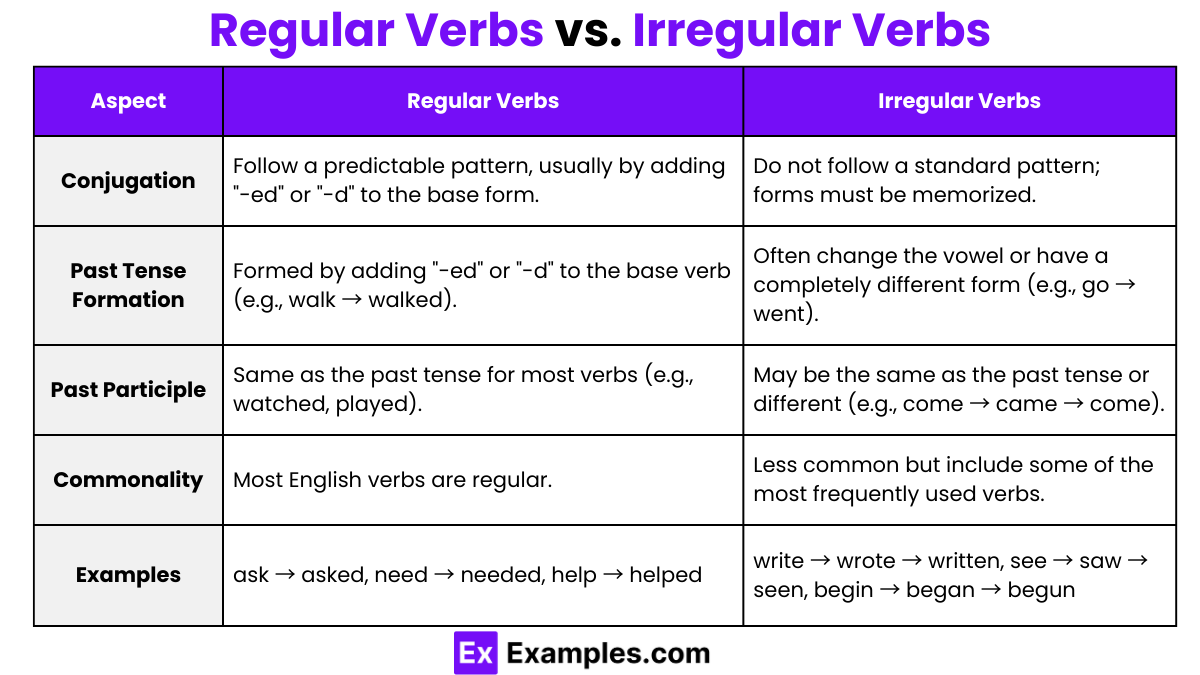
Examples of Regular Verb in Tenses
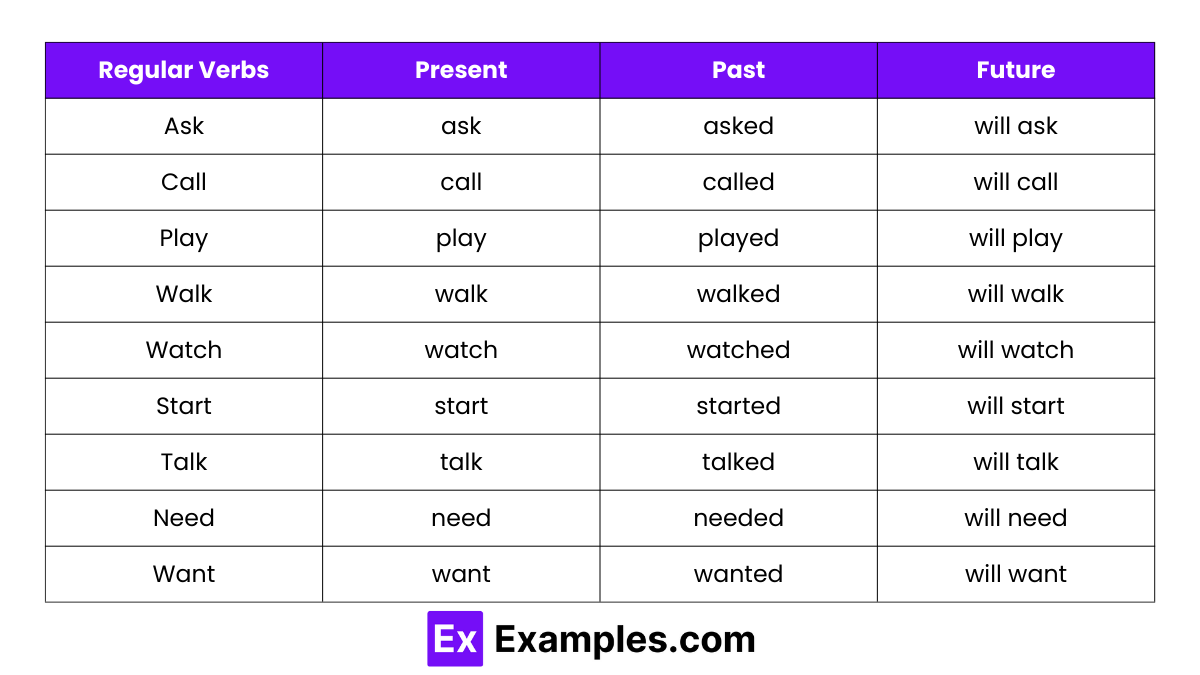
Examples of Irregular Verb in Tenses
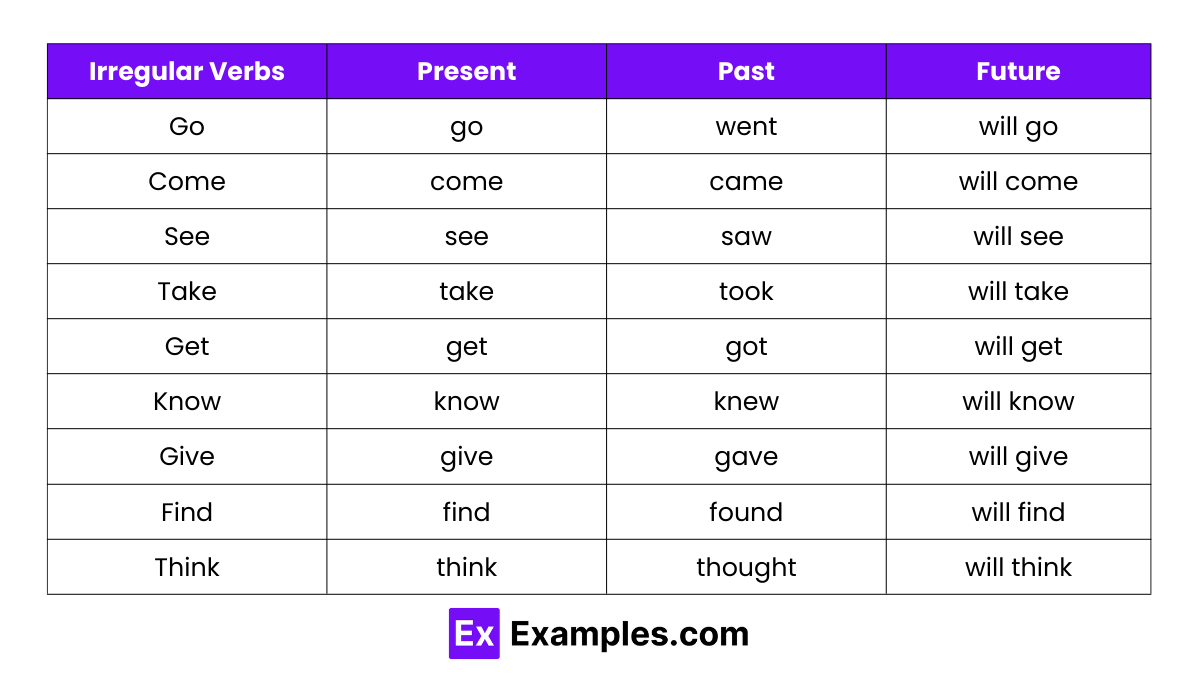
Verbs in English
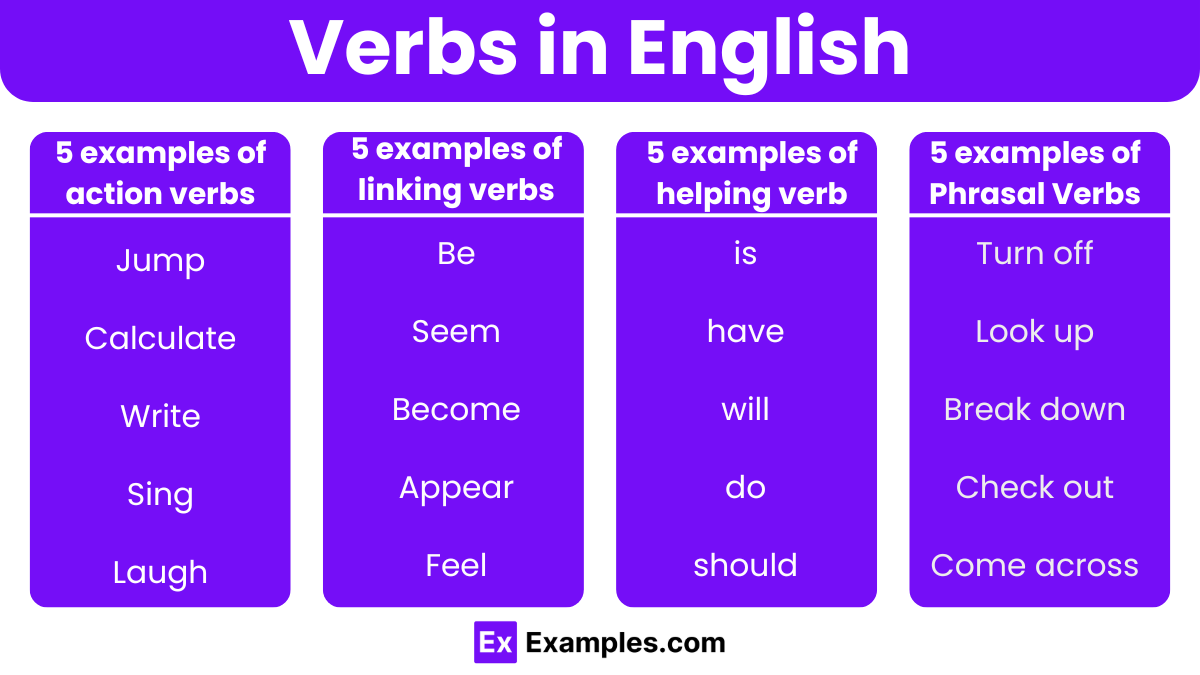
1. Types of Verbs
2. Being Verbs Template
3. Finding Real Verbes Template
4. Checklist for Recognizing Complete Verbs
5. Sentences with Linking Verbs
6. Active and Passive Verb
7. Rhetorically Accurate Verbs
8. Verbs of Attribution Template
9. Finite and non-finite Verbs
10. Main and Helping Verbs
11. Past Tense Verbs
12. Verbs for Reporting
13. List of Performance Appraisal Action Verbs
14. Power Verbs For Your Resume
15. Identifying Verbs and Subjects
16. Verb Tenses Template
Importance of Verb in a Sentence
-
Action Expression: Verbs are crucial for expressing actions, movements, or processes, making them fundamental to stating what the subject is doing.
-
State of Being: Verbs like “am,” “is,” and “are” indicate states of existence or conditions, essential for describing subjects.
-
Tense Conveyance: Verbs determine the tense of a sentence, signaling when an action is happening—past, present, or future.
-
Structural Foundation: Verbs form the backbone of sentence structure, linking the subject to further information.
-
Mood and Modality: Verbs help express mood and modality through modal verbs (can, may, must), reflecting necessity, possibility, or permission.
-
Voice Construction: Active and passive voice constructions are determined by verb usage, affecting the focus and clarity of the sentence.
-
Question Formation: Verbs are pivotal in forming questions, which are essential for interactive and engaging communication.
-
Command Delivery: In imperative sentences, the verb instructs or requests, making clear commands possible.
Common Mistakes with Verbs
When learning or using English, certain verb-related errors are common. Here are some typical mistakes to watch for:
-
Incorrect Tense Usage: Misapplying tenses can lead to confusion about when an event occurred. For example, mixing up “speak” and “spoke” can distort the timing of actions.
-
Subject-Verb Agreement Errors: Every verb must agree in number with its subject. Singular subjects take singular verbs, and plural subjects take plural verbs. For instance, saying “He go” instead of “He goes” is incorrect.
-
Misusing Irregular Verbs: Irregular verbs can be tricky because they do not follow the standard “-ed” pattern for past tense. A common mistake is incorrectly conjugating these, such as “breaked” instead of “broke.”
-
Overusing Passive Voice: While not grammatically incorrect, excessive use of passive voice (“The ball was thrown by John”) instead of active voice (“John threw the ball”) can make sentences weaker and less direct.
-
Confusing Similar Verbs: Some verbs are often mixed up, like “lay” and “lie,” or “raise” and “rise,” leading to improper usage.
-
Modal Verb Misuse: Modal verbs (can, could, may, might, must, shall, should, will, would) are sometimes used interchangeably or incorrectly, impacting the clarity of obligation or possibility in a statement.
-
Inconsistent Verb Forms in Lists: When listing actions, the verbs should maintain the same form. An error would be, “She likes dancing, to swim, and biking,” instead of the consistent “She likes dancing, swimming, and biking.”
-
Dangling Modifiers with Participle Phrases: A common mistake is misplacing the modifier so it doesn’t clearly refer to the noun it’s modifying, e.g., “Running to catch the bus, the bag fell open,” suggests the bag was running, which is illogical.
-
Forgetting to Use Infinitive with Certain Verbs: Some verbs require an infinitive after them, and omitting the “to” can sound awkward or be grammatically wrong, such as in “She helped to clean” vs. “She helped clean.”
FAQs
What is a simple verb sentence?
It is common knowledge that a complete sentence has at least three parts, or SVO: subject, verb, and object. Nevertheless, because a simple predicate is a verb or verb phrase alone, a sentence may also consist of only a subject and a verb (SV).
How do you use two verbs in a sentence?
Example: She posed as his friend, but she was often making fun of him behind his back. Use the GERUND form of the second verb in a verb phrase when you start your sentence with any of these verbs. As an example, many individuals have the intention of quitting smoking but put off doing so for numerous reasons.
How many verbs are in a sentence?
Depending on the sentence’s complexity, more than one major verb may appear. Although only one main verb is used in any given phrase, a sentence with numerous clauses and subjects may contain several different main verbs.
There is a wide variety of verbs. Several verbs fall outside of the broad categories of action, thought, and being, although they are far from exhaustive. In reality, more than 10 distinct classes of verbs may be distinguished according to their intended purposes.


